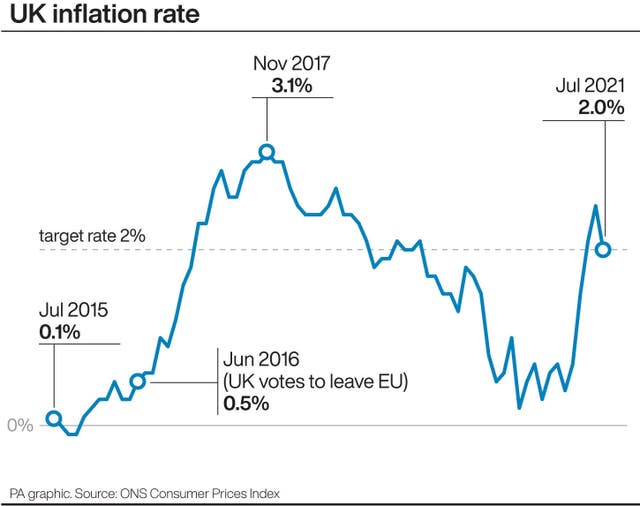
James O'Brien 10am - 1pm
18 August 2021, 09:54

With inflation hitting the Bank of England’s target of 2% the pressure to raise interest rates will dissipate in the short term.
Inflation has cooled slightly in the UK, hitting 2% in June compared with a year ago, down from 2.5% in July.
The 2% level was below economists’ expectations but analysts warn that the post-pandemic boom could continue to hit prices.
However, with inflation hitting the Bank of England’s target of 2% the pressure to raise interest rates will dissipate – at least in the short term.
The PA news agency rounds up some of the reaction.
The Consumer Prices Index including owner occupiers’ housing costs (CPIH) was 2.1% in the 12 months to July 2021.
This was down from 2.4% in the 12 months to June 2021 https://t.co/5trxIDcP4Q pic.twitter.com/Pz516XPWEG
— Office for National Statistics (ONS) (@ONS) August 18, 2021
– Debapratim De, senior economist at Deloitte, said: “July’s inflation figures are lower than expected. But this does not signal an easing of underlying price pressures.
“The sharp rise in input prices over the same month shows that supply continues to struggle to keep up with resurgent demand.
“The data seem consistent with the Bank of England’s expectations of some policy tightening over the next two years.
“If UK growth continues as forecast, without a major Covid-19 wave in the winter months, we are likely to see the first interest rate rise by next summer.”
– Bridget Phillipson MP, Labour’s shadow chief secretary to the Treasury, said: “People are already feeling the effects of inflation, whether it’s at the supermarket, petrol pump or paying for home improvements.
“The Government must do all it can do to keep materials and other supplies moving to prevent the shortages that can lead to higher costs.
“Whether the inflation is temporary or otherwise, families should not have to pay the price for the Government’s lack of plan for HGV drivers and the costly red tape following their deal with the European Union.”

– Martin Beck, senior economic adviser to the EY ITEM Club, said: “July’s data is likely to represent brief respite from the upward movement in inflation rates.
“August will see base effects push annual inflation up again, with last August having seen both the VAT cut for the hospitality sector and the Eat Out to Help Out scheme.
“Indeed, it could be possible that the annual CPI rate will rise by as much as one percentage point between July and August.”
– Ed Monk, associate director for personal investing at Fidelity International, said: “Inflation easing back last month will be a relief to households who have seen many everyday items getting more expensive this year.
“Part of the fall today is due to the uneven supply of goods at the start of the pandemic in 2020, when many items fell out of the statistics for a time and then returned at higher prices.
“But underneath that, prices in some areas are still sharply higher and bottlenecks in global supply chains are likely to continue to muddy the picture for inflation for many months.”
– Jay Mawji, managing director of global liquidity provider IX Prime, said: “Yesterday’s employment data revealed the economy is coming along nicely, piling on more than half a million jobs in the past three months alone.
“Today’s news that all this is happening without significant inflationary side effects will be music to the ears of the equity markets, and further upward progress in the main indices is now likely.”
– Luke Bartholomew, senior monetary economist with Aberdeen Standard Investments, said: “Today’s decline in inflation is welcome but likely to be relatively short lived as price pressures mount over the next few months.
“In particular, the ending of the VAT cut for hospitality, an increase in energy prices, and shortages in various sectors combine to push inflation well above the Bank of England’s target by the end of the year.
“However, It will be important for investors to look through this bumpy period, and not extrapolate a trend of much higher inflation, as many of those effects should be temporary, and allow inflation to start falling next year.”
– Douglas Grant, director of Conister, part of Manx Financial Group, said: “The UK isn’t currently experiencing runaway inflation like in the US.
“This is not the say that rates won’t pick up over the coming months as more of the pandemic cost burden is passed on to consumers, but as per UK GDP data last week, we are seeing more encouragement for the future of the UK economy.
“One area of concern however is current business default levels caused by the ongoing impact of the pandemic, and we must acknowledge that the UK’s business debt burden has ballooned to unprecedented levels and unfortunately this has already created a relentless flow of weak zombie-like companies falling off a loan default cliff.”
– Tom Pugh, UK economist at RSM, said: “This is only a temporary pause before CPI inflation surges to above 4% by the end of the year, as the recent rises in food, oil and energy prices make themselves felt.
“Crucially, though, we expect this surge in CPI inflation to be temporary. Indeed, CPI inflation should be back below the Bank of England’s Monetary Policy Committee’s 2% target by the end of 2022.”
– Neil Messenger, director of client and markets at 1825, said: “July’s inflation dip is likely to be transitory – so savers shouldn’t get too comfortable.
“In this environment, savers simply can’t afford to be complacent.
“With interest rates remaining low, and with the Bank reluctant to raise the base rate any time soon, it’s important individuals review what they can do now to give their funds the best chance of preserving value or achieving real-term growth.”